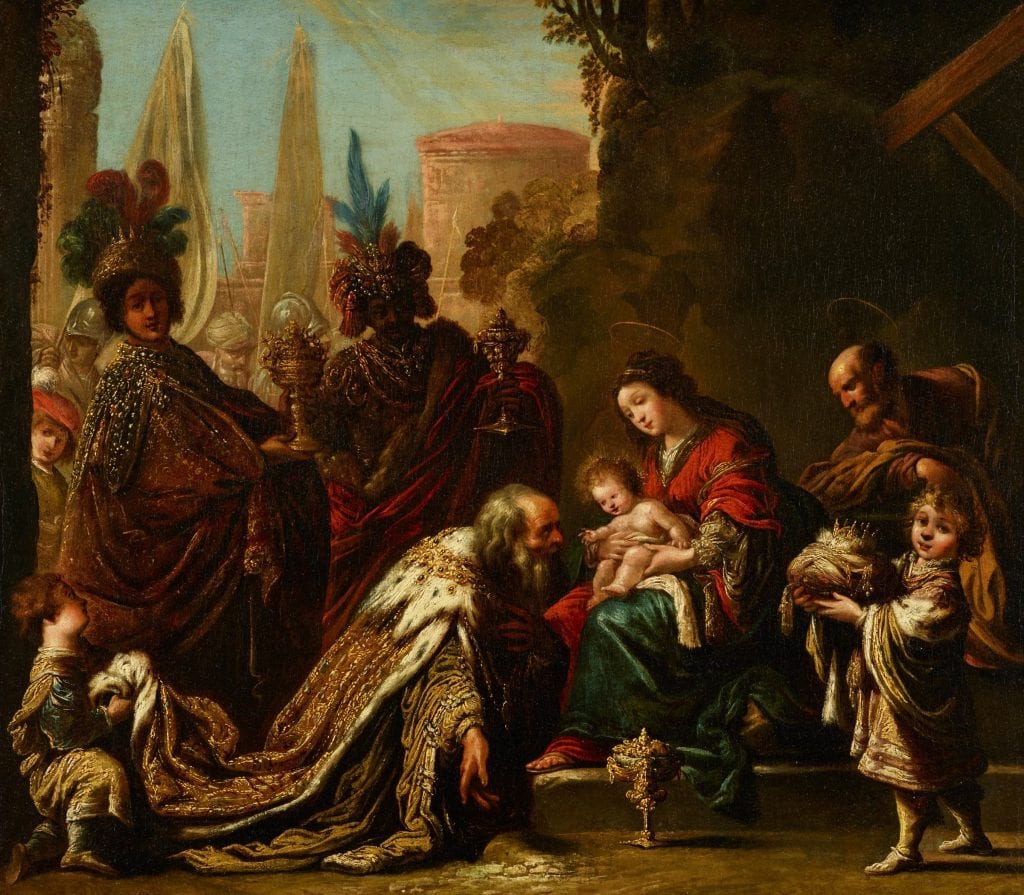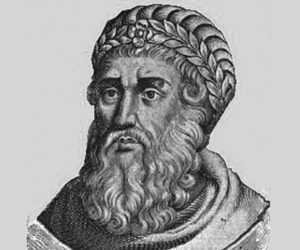Magi – In a Jewish Nativity Story?

Magi were scorned by Judaism for their mystical reputation.[1] Not motivated by an ancient prophecy nor a prophet, an angelic appearance, or any type of divine revelation; rather, the Magi’s actions were compelled by an awe-inspiring scene they observed in the night sky.
Clearly was not worried the inclusion of the Magi in his account would be called into question by his contemporaries, Matthew’s introduction of the Magi into the Nativity story had a full historical context behind its setting. Matthew covered the wise men magi story with 12 verses, at least 10 providing specific details.[3]
Greek text of Matthew uses the word magos, the Latin word equivalent to magus, its plural form is magi.[2] The word is sometimes translated into English as “wise men” – both translations are correct.
Babylonians, Medes and Persians viewed magos as an eclectic group of priests, physicians, teachers, soothsayers, interpreters of dreams, astrologers, and sorcerers making it easy for magi to be referred to as “mystics.” Not surprisingly, magi is the root word of “magic.”
MT 2:1 “After Jesus was born in Bethlehem in Judea, during the time of King Herod, Magi from the east came to Jerusalem…” (NIV)
MT 2:1 “In the time of King Herod, after Jesus was born in Bethlehem of Judea, wise men from the East came to Jerusalem…” (NRSV)
Roman era Jewish society had a dual-perspective of magi. One perspective was that of the famed Hebrew, Daniel, a Israelite of royal descent captured by Nebuchadnezzar. Daniel was placed into the elite Babylonian school of the Chaldeans where he received an education in astronomy and astrology.[5]
God gave “Daniel understanding in all visions and dreams,” a gift that landed him in Nebuchadnezzar’s royal council of wise men, the chakkiym.[6] Later, Nebuchadnezzar made Daniel chief of all magi, a position known as Rab-mag.[7]
After the Medes and Persians overthrew the Babylonian Empire, Daniel’s “extraordinary spirit” again elevated him to a high level in the new government.[8] Under King Cyrus the main religion was Zoroastrianism where its founder, Zoroaster, was is often considered to be the original magi and priests of Zoroastrianism were called “magi.”.[9]
Setting the stage for the other Jewish perspective of magi began when Alexander the Great marched through Judea. Open-minded Hellenistic culture of the Greek Empire allowed the Jews religious freedom, but it also introduced Zoroastrianism that was intermingled with the influences of the Babylonian chakkiym. [10]
Over the coming decades, the effects of Hellenism on Jewish culture was unavoidable much to the frustration of the Jewish Rabbis. Liberal philosophies of Hellenism permeated Jewish culture meanwhile Greek became the common language.[11] Next came the Roman Empire which seemed content to leave the prevailing culture in Judea alone.[12]
As expert astronomers, magi used the legendary Babylonian astronomical science and charts to study of the motion of stars past, present and future. Ability to plot upcoming cosmic events by these wise men were scientifically predictive, not “mystical.”[13]
Toward the very end of the BC era a series of rare celestial conjunctions occurred, ones hard to ignore by astronomers then or today. Witnessing just one such rare conjunction can be an once-in-a-lifetime experience. Imagine the scenario where, in a space of just 5 years from 7-2 BC, there were 13 rare conjunctions including two triple conjunctions![14]
Zoroastrianism beliefs held that celestial events served as signs with earthly significance. Signs of a newborn king observed by the magi were so awe-inspiring, they set out on a month’s long quest to find and worship him.[15] Matthew does not say there were only three magi...the number of magi may or may not be accurate.
Not just anyone appearing on the door step of the King’s palace would expect to gain entry. Signifying King Herod‘s regard for magi, when they arrived unannounced the magi had no problem gaining direct access to the King who gave them his immediate and full attention.
Herod did not question the credibility of the magi when they gave him the alarming news about the birth of a King of the Jews. Neither did Herod’s Jewish religious experts who pointed the King to Micah’s prophecy saying a Jewish ruler was to be born in Bethlehem.
Believing the prophecy to be true, Herod invited the magi back for another meeting to investigate the timing of the star, directed them to Bethlehem, slyly asking for their help in finding the exact location of this newborn king. Angered when they didn’t return, Herod’s reaction by killing all the children 2 years old and under in the Bethlehem district demonstrates his belief in the truth of the magi’s message about a newborn King of the Jews.
King Herod and his royal Jewish religious council believed the credibility and message of the magi. How likely is it that the Jewish author of Matthew would unnecessarily introduce the magi…unless the author also believed it to be true?
Updated September 29, 2024.
This work is licensed under a Creative Commons Attribution-NonCommercial-NoDerivatives 4.0 International License.
REFERENCES:
[1] Deuteronomy 4, 18. Soncino Babylonian Talmud. Sanhedrin 98a. <https://israelect.com/Come-and-Hear/sanhedrin/sanhedrin_98.html> “Zoroastrianism – Magi.” Geni. 2016. <https://www.geni.com/projects/Zoroastrianism-Magi/13185>
[2] “magus.” WordReference.com. <http://www.wordreference.com/es/translation.asp?tranword=magus> “magi.” WordReference.com. <http://www.wordreference.com/es/translation.asp?tranword=magi> “magus.” Merriam-Webster <https://www.merriam-webster.com/dictionary/magus>
[3] Matthew 2:1-12.
[4] Martin, Ernest L. The Star of Bethlehem – The Star That Astonished the World. 2017. Chapter 2. A.S.K. (Associates for Scriptural Knowledge. <http://web.archive.org/web/20170226050457/http://www.askelm.com/star/star002.htm>
[5] Daniel 1. Guisepi, Robert. “The Chaldeans, The Chaldeans (Neo-Babylonian) Empire.” International World History Project. 2007. <http://history-world.org/chaldeans.htm> “Chaldea.” Encyclopædia Britannica. 2014. <http://www.britannica.com> “Chaldea.” Jewish Encyclopedia. 2011. <http://www.jewishencyclopedia.com/articles/4213-chaldea>
[6] NKJV. Daniel 1- 2. “Magi.” New World Encyclopedia. 2014. <http://web.archive.org/web/20211122161026/http://www.newworldencyclopedia.org/entry/Magi> Net.bible.org. Daniel 2:12 Hebrew text “chakkiym” <02445>. “Chaldea.” Jewish Encyclopedia. Diodorus of Sicily. Mesopotamia: Ninus, Semiramis, the wonders of Babylon; Sardanapalus, Chaldaean astrology. Vol. I. Book II. University of Chicago|Bill Thayer. 2017. Page 431 # 24 ; p 447-457 #29-31. <http://penelope.uchicago.edu/Thayer/E/Roman/Texts/Diodorus_Siculus/home.html>
[7] Jeremiah 39:3, 13.
[8] NASB. Daniel 6, 10-12. Deuteronomy 4:19. Gascoigne, Bamber. “History of Zoroastrianism.” HistoryWorld.net. n.d. <http://www.historyworld.net/wrldhis/PlainTextHistories.asp?historyid=ab71> “Zoroastrianism – Magi.” Geni. “Daniel, the Magi and the Luni-solar Calendar of Israel.” TryGod.com. 2017. <http://try-god.com/daniel-the-magi-and-the-luni-solar-calendar-of-israel.php
[9] Zoroastrianism.” Jewish Encyclopedia. 2011. <http://www.jewishencyclopedia.com/articles/15283-zoroastrianism> Eduljee, K. E. “Magi – Zoroastrian Priests.” Zoroastrian Heritage. 2012. <http://zoroastrianheritage.blogspot.com/2012/09/magi.html>
[10] “Hellenism.” Jewish Encyclopedia. 2011. <http://www.jewishencyclopedia.com/articles/7535-hellenism>. Hooker, Richard. “Alexander the Great – Hellenistic Greece.” Washington State University. 1999. <http://web.archive.org/web/20110104072822/http://www.wsu.edu/~dee/GREECE/ALEX.HTM> “Zoroastrianism – Magi.” Geni. “Zoroastrianism.” BBC|The British Broadcasting Corporation. 2009. <http://www.bbc.co.uk/religion/religions/zoroastrian> Jafarey, Ali Akbar. “The Achaemenians, Zoroastrians in Transition.” CAIS|The Circle of Ancient Iranian Studies. 2015. <http://www.cais-soas.com/CAIS/Religions/iranian/Zarathushtrian/achaemenian_zarathushtrian.htm> Hooker, Richard. “Mesopotamia: The Persians.” Washington State University. 1996. <http://web.archive.org/web/20110514001358/http://www.wsu.edu/~dee/MESO/PERSIANS.HTM> Hooker, Richard. “Hellenistic Greece: Hellenism.” Washington State University. 1999. <http://web.archive.org/web/20110104072353/http://www.wsu.edu/~dee/GREECE/HELLGREE.HTM> “Zoroastrianism.” ReligionFacts.com. 2014. <http://www.religionfacts.com/zoroastrianism/index.htm> Reed, Vicky. “The Religion of the Persian Empire.” EsthersLegacy.com. 2011. <http://estherslegacy.com> “Zoroastrianism.” PersianEmpire.info. 2007. <http://persianempire.info/zoro.htm> Gascoigne. “History of Zoroastrianism.” Gascoigne, Bamber. “Iran (Persia) timeline.” HistoryWorld.net. n.d. <http://www.historyworld.net/timesearch/default.asp?conid=static_timeline&timelineid=759&page=1&keywords=Iran+%28Persia%29+timeline> Eduljee. “Greek Perceptions of Zoroaster, Zoroastrianism & the Magi.” Zoroastrian Heritage. 2011. <http://zoroastrianheritage.blogspot.com/2011/04/greek-perceptions-of-zoroaster.html> Leverington, David A. Babylon to Voyager and Beyond – A History of Planetary Astronomy. Chapter 1. 2003. <http://assets.cambridge.org/97805218/08408/sample/9780521808408ws.pdf> Diodorus. Mesopotamia: Ninus, Semiramis, the wonders of Babylon; Sardanapalus, Chaldaean astrology. Vol.I, Book II. Page 457; #31.
[11] Josephus. Antiquities of the Jews. Book XII, Chapter II.
[12] Hooker. “Hellenistic Greece: Hellenism.” Petrucci, Valerio. “Hellenization and Romanization – the Dialogue Between Greek and Roman Cultures in the 1st and 2nd Centuries.” 2017. Academia. <https://www.academia.edu> “Judaea.” Livius.org. Ed. Jona Lendering. 2019. <https://www.livius.org/articles/place/judaea>
[13] Eduljee, K. E. “Greek Perceptions of Zoroaster, Zoroastrianism & the Magi.” Zoroastrian Heritage. 25 Apr. 2011. <http://zoroastrianheritage.blogspot.com/2011/04/greek-perceptions-of-zoroaster.html> Leverington. Babylon to Voyager and Beyond – A History of Planetary Astronomy. Chapter 1.
[14] Carroll, Susan S. “The Star of Bethlehem: An Astronomical and Historical Perspective.” Pulcherrima Productions. 1997. Twin Cities Creation Science Association. n.d. <http://www.tccsa.tc/articles/star_susan_carroll.pdf> Phillips, Tony. “A Christmas Star for SOHO.” NASA Science | Science New. 16 May 2000. <http://science.nasa.gov/science-news/science-at-nasa/2000/ast16may_1> “Birth of Jesus.” Navsoft.com. 2012. <http://navsoft.com/html/birth_of_jesus.html> Martin. The Star of Bethlehem. Chapters 1, 4. <http://web.archive.org/web/20170111193244/http://www.askelm.com/star/star001.htm> <http://web.archive.org/web/20170821004027/http://www.askelm.com/star/star004.htm> Cain, Fraser. “Venus and Jupiter’s Upcoming Conjunction.” Universe Today. 29 Oct. 2004. <http://www.universetoday.com/10006/venus-and-jupiters-upcoming-conjunction/#ixzz2B6cvKJEt> Sielaff, David. “An Important August 2 B.C.E. Conjunction.” A.S.K. (Associates For Scriptural Knowledge), 2005. <http://www.askelm.com/news/n051211.htm> Clevenger, John. “Astronomy, Astrology, and the Star of Bethlehem.” Lake County (Illinois) Astronomical Society. n.d. <http://www.lcas-astronomy.org/articles/display.php?filename=the_christmas_star&category=miscellaneous> Haley, A. S. “The Star of Bethlehem and the Nativity.” Anglican Curmudgeon. 2009. <http://accurmudgeon.blogspot.com/2009/10/star-of-bethlehem-and-nativity.html> Newman, Robert C. “The Star of Bethlehem: A Natural-Supernatural Hybrid?” Interdisciplinary Bible Research Institute. IBRI Paper (2001). <http://www.newmanlib.ibri.org/Papers/StarofBethlehem/75starbethlehem.htm> Beatty, Kelly. “Venus and Jupiter: Together at Last.” Sky & Telescope. 25 June 2015. <http://www.skyandtelescope.com/astronomy-news/observing-news/venus-and-jupiter-a-dazzling-duo-062520154> Ratnikas, Algis. “Timeline 499BCE – 1BCE.” Timeslines of History. n.d. <http://timelines.ws/0D499_1BC.HTML> Pratt, John P. “The Star of Bethlehem’s Forerunner.” JohnPratt.com. <http://www.johnpratt.com/items/docs/lds/meridian/2000/xmas_star.html> “Star of Bethlehem May Have Been Planets Jupiter, Venus.” IU News Room. 16 Dec. 2003. <http://newsinfo.iu.edu/news/page/normal/1203.html&t=Star%20of%20Bethlehem%20may%20have%20been%20planets%20Jupiter%20and%20Venus> Mosley, John. “Common Errors in ‘Star of Bethlehem’ Planetarium Shows.” Third Quarter 1981, International Planetarium Society, Inc. n.d. <http://www.ips-planetarium.org/?page=a_mosley1981> Flescher, Eric and Sessions, Larry. “Ten ‘Star’ of Bethlehem Myths: Part II.” Space.com. 26 Dec. 2001. <http://web.archive.org/web/20041205014757/http://space.com:80/SpaceReportersNetworkAstronomyDiscoveries/flescher_Xmasstar2_122601.html> Cain, Fraser. “Venus-Jupiter Conjunction, March 15th, 2012.” Universe Today. 13 Mar. 2012. <http://www.universetoday.com/94113/venus-jupiter-conjunction-march-15th-2012 > Fazekas, Andrew. “Christmas Star Mystery Continues.” National Geographic Daily News. 24 Dec. 2008. <http://news.nationalgeographic.com/news/2008/12/081224-star-bethlehem.html>
[15] “Trade between the Romans and the Empire of Asia.” Heilbrunn Timeline of Art History. <http://www.metmuseum.org/toah/hd/silk/hd_silk.htm> National Museum of American History, “Trade Routes” > “Major Trade Routes of 2nd Century BCE – 1st Century CE.” <http://web.archive.org/web/20160618154742/http://americanhistory.si.edu:80/numismatics/parthia/frames/pamaec.htm> “Iran Historical Maps Arsacid Parthian Empire, Armenian Kingdom.” Atlas of Iran Maps. n.d. Iran Politics Club. 2014. <http://iranpoliticsclub.net/maps/maps04/index.htm>


 Three of David’s brothers were fighting in Israel’s army supported by their father who routinely sent David to them with supplies. During one visit, David was astonished to see Israel’s army afraid of an ace giant Philistine warrior named Goliath who challenged and taunted Israel’s army daily.
Three of David’s brothers were fighting in Israel’s army supported by their father who routinely sent David to them with supplies. During one visit, David was astonished to see Israel’s army afraid of an ace giant Philistine warrior named Goliath who challenged and taunted Israel’s army daily. Uriah was summoned from the battlefield at the behest of David under the pretense of earning a well-deserved leave from duty. The true reason was to give Bath-Sheba an opportunity to have marital relations with her husband to legitimize her pregnancy.
Uriah was summoned from the battlefield at the behest of David under the pretense of earning a well-deserved leave from duty. The true reason was to give Bath-Sheba an opportunity to have marital relations with her husband to legitimize her pregnancy.